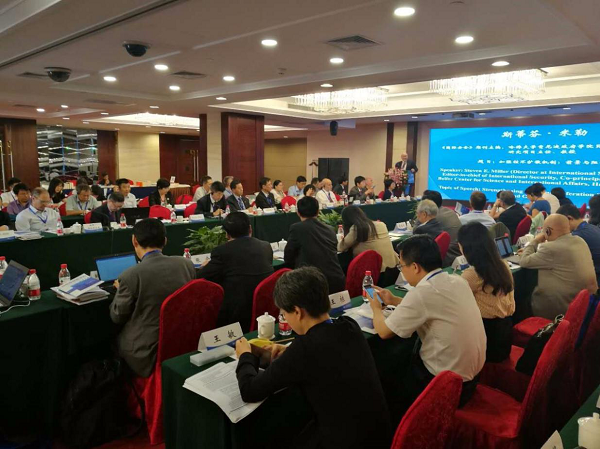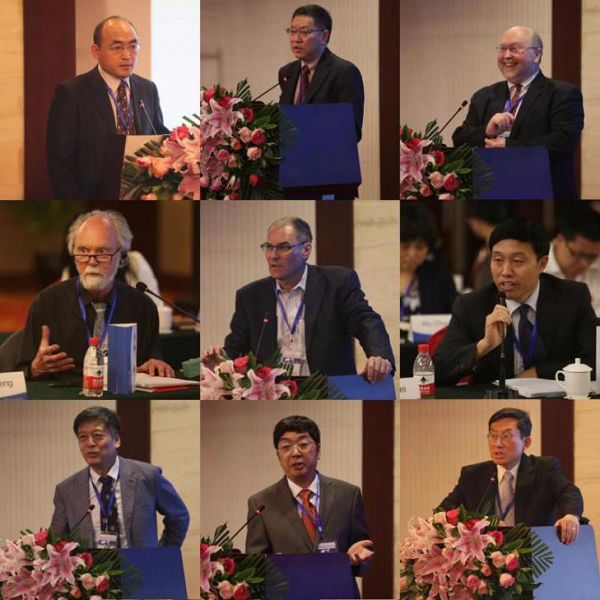International Symposium on Accessing the International Nuclear Agenda
International Symposium on Accessing the International Nuclear Agenda
Held in Beijing
Hosted by the University of International Relations (UIR), the International Symposium on Accessing the International Nuclear Agenda was held in Beijing on June 16th and 17th. The event was jointly organized by the Journal of International Security Studies and the Project on Managing the Atom (MTA) of the Belfer Center for Science and International Affairs, Harvard Kennedy School.

A view of the symposium
Keynote speakers at the symposium included Dong Zhihua, Deputy Director-General of the Department of Arms Control, Ministry of Foreign Affairs of the People’s Republic of China, An Yuejun, Secretary-General of the Chinese People’s Association for Peace and Disarmament, Prof. Martin Malin, Executive Director of MTA, and Prof. Tao Jian, President of UIR. Prof. Wu Hui, Vice President of UIR, officiated the opening ceremony.

Prof. Tao Jian, President of UIR

Sun Zhiming,Vice President of UIR

Wu Hui, Vice President of UIR
In his speech, Prof. Tao Jian identified the nuclear issue as a major subject of common concern in the international community that has significant bearings on the destiny of humanity. He believed the solution to the issue lies in global governance given its cross-border nature. He also pointed out that governance of global security is an important area of study in UIR before he went on to introduce the university’s scholars who focus on this area and the latest developments of the Journal of International Security Studies.

Dong Zhihua, Deputy Director-General, the Department of Arms Control,
Ministry of Foreign Affairs, PRC
Dong Zhihua analyzed the prominent problems and major difficulties facing the international community in terms of nuclear disarmament, nuclear non-proliferation and peaceful use of nuclear energy, the three recognized topics on the international nuclear agenda. Addressing these problems and challenges, she believed, requires multi-pronged equitable solution to tackle both specific issues and their root causes on the basis of equity. All stakeholders should participate in finding a win-win solution and all parties concerned should be regulated by the same rules and principles.

An Yuejun, Secretary-General,
Chinese People’s Association for Peace and Disarmament
An Yuejun noted that with the international nuclear disarmament process nearly stagnated and multiple risks of international nuclear conflicts, the situation of global nuclear safety is not very promising. Countries should follow a sensible, coordinated and balanced approach to establish a community of shared future on nuclear security, and try to bring a soft-landing to the DPRK nuclear issue as soon as possible. The ultimate goal is to create an overall favorable international security environment through practicing the principle of common security.

Martin Malin, Executive Director, Project on Managing the Atom,
Belfer Center for Science and International Affairs, HKS
Prof. Martin Marlin believed that the international environment is experiencing dramatic changes, with emerging uncertainties and rising nuclear terrorist threats. And trends in recent years are not optimistic, he said. The international nuclear disarmament and nuclear arms control has hit an impasse, while Russia and other countries in Europe are confronted with risks and threats. He hoped that the international society could make concerted efforts and draw upon China’s experience to cope with future challenges.

A view of the symposium
After the opening ceremony, speeches and warm discussions ensued under topics of “Nuclear Security and Non-Proliferation: Policy-making and Dilemma”, “Global Governance of Nuclear Security: Progress, Challenges and Cooperation”, “ Proliferation”, “Dilemmas and Governance of Nuclear Arms Control” and “Staying Safe in a Nuclear Era: Our Proposals”. Speakers and experts also answered questions from audiences.

Tan Xiuying, Chief Editor, Journal of International Security Studies
Dai Changzheng, Professor, Dean, School of International Relations,
University of International Business and Economics
The symposium also launched an Index of International Security Based on Situational Awareness 2017, and Prof. Dai Changzheng of the School of International Relations, University of International Business and Economics, and Tan Xiuying, Editor-in-Chief of the Journal of International Security Studies, made an introduction of the index.

Speakers from China and Other Countries
More than one hundred scholars and experts from universities, research institutions and government departments in US, Europe, Japan, Korea and China attended the symposium and debated warmly on topics of interest. Barry Buzan, Emeritus Professor of the London School of Economics and Political Science, a leading figure of the ‘British School’ of international relations, was of the view that the world is entering a post-West era,where possession of nuclear weapons is closely related to the status of a country; as extended deterrence fades away, regional nuclear deterrence should be given more consideration. Professor Steven Miller, Director of Project on Managing the Atom of the Belfer Center for Science and International Affairs, HKS, also Editor-in-Chief of the Journal of International Security, shared his thoughts on the nuclear non-proliferation regime, and put forward proposals and perspectives to improve the regime. Experts and scholars from China also expressed their views on topics of “International Cooperation on Nuclear Security and Non-Proliferation”, “Sino-U.S. Strategic Stability”, “(On) Nuclear Justice”, “Impact of DPRK Nuclear Test on China” and ‘How should China and US Promote Nuclear Disarmament”.
The symposium is not only a good platform for scholars from China and other countries to study the current international nuclear agenda, but also a valuable opportunity to establish the study of international nuclear security as an independent subject of research in international relations. Support and assistance from the leadership and relevant departments of UIR have greatly facilitated this event, which is hailed as a success and is the fourth international symposium in a roll organized by the Journal of International Security Studies in the last four years.
June 17, 2017
Editorial Office, Journal of International Security Studies, UIR